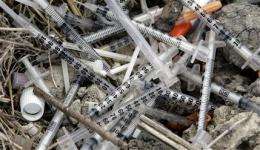UN investigator says medical waste risks ignored

(AP) -- A human rights investigator for the United Nations says up to a quarter of the world's trash from hospitals, clinics, labs, blood banks and mortuaries is hazardous and much more needs to be done to regulate it.
Calin Georgescu, a U.N. special rapporteur, says few nations are developing the rules needed to cope with the growing mountains of medical waste that pose a hidden risk of infection and could expose people to low levels of radioactivity and needle-stick injuries.
In a report to the U.N. Human Rights Council, he said nations pay "too little attention" to their tons of waste each year - waste that contains pathogens, blood, low levels of radioactivity, discarded needles, syringes, scalpels, expired drugs and vaccines. In many poorer nations, discarded chemicals and pharmaceutical wastes go straight to city dumps, down hospital toilets into water systems, or are burned in cement kilns that just add to dioxide emissions.
Norwegian diplomat Hans Ola Urstad told the council many developing nations face "an unsustainable inflow" of medical trash and "a considerable increase in the export of hazardous waste" from wealthy countries.
In August, Amnesty International said thousands of people in Ivory Coast still await compensation for illness caused by toxic waste illegally exported from Amsterdam in a tanker chartered by Trafigura Beheer BV in 2006.
Rich nations typically generate up to 6 kilograms (13 pounds) per person a year of hazardous medical wastes, according to the World Health Organization, while lower-income countries produce up to 3 kilograms (6.6 pounds).
WHO says millions of cases of hepatitis and tens of thousands of HIV infections could be prevented each year if syringe needles were disposed of safely instead of getting reused without sterilization. It says radioactive medical waste killed four people in Brazil in 1988, and similar accidents occurred before then in Algeria, Mexico and Morocco.
Georgescu noted that "at times, medical waste is illegally shipped to other countries" but more often it is dumped illegally or combined with household discards. He noted an incident in 2009 when Brazil returned 89 containers to Britain that were shipped as recyclable plastic, but held used syringes, condoms and old medicine.
Georgescu recommended all nations adopt better laws for managing medical waste and replace incinerators with "more environmentally friendly and safe methods of disposal" such as autoclaving, which uses pressurized steam and superheated water to disinfect waste and medical equipment.
He urged wealthy nations to provide aid to developing countries to better manage these wastes.
©2011 The Associated Press. All rights reserved. This material may not be published, broadcast, rewritten or redistributed.


















